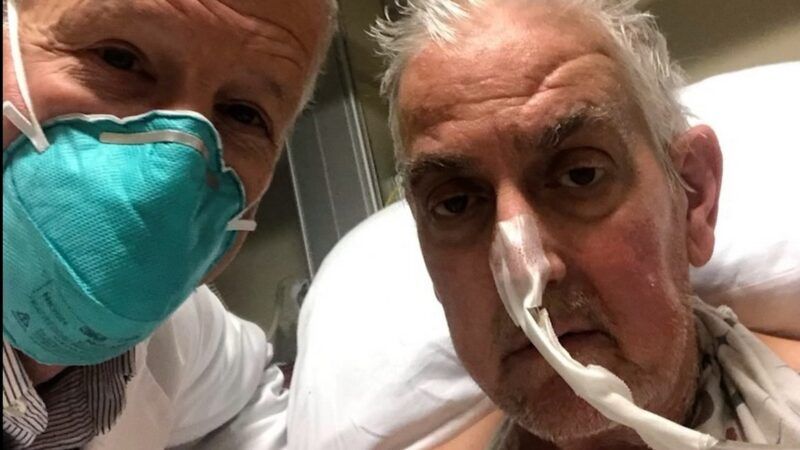Everyone Deserves To Benefit from Medical Innovation. Yes, Even People Who Did Bad Things.
The New York Times and The Washington Post shamed the recipient of a pig heart transplant for committing a crime 35 years ago.

The Washington Post and The New York Times want you to know, for some reason, that a man who recently received a pig heart in a pioneering transplant is no angel.
David Bennett, 57, has terminal heart disease and last week received a genetically modified pig heart in a transplant. It was an innovative first-of-its-kind surgery that has the potential to save many lives down the line. Bennett was ineligible for a human heart transplant due to issues of heart failure and an irregular heartbeat, doctors said. Arguably, this type of surgery was his only option.
In 1988, Bennett was convicted of stabbing a man seven times, leaving him paralyzed. The victim, Edward Shumaker, spent the next two decades in a wheelchair, had a stroke in 2005, and died two years later just before he turned 41.
None of this has anything to do with Bennett's treatment. And yet two of the most prominent newspapers in the United States have decided to report on a crime Bennett committed when he was 22 years old. The Post reported it first, based apparently on members of Shumaker's family reaching out and complaining about the transplant. Shumaker's sister, Leslie Shumaker Downey, is not happy that Bennett received this lifesaving treatment.
"[Bennett] went on and lived a good life," she told the Post. "Now he gets a second chance with a new heart—but I wish, in my opinion, it had gone to a deserving recipient."
It is absolutely normal for Downey to feel as though this is completely unfair, given her deeply personal connection to Bennett's crime. We shouldn't be judging Downey here. But how she feels should not have any sway over Bennett's medical treatment, and it's irresponsible for these major media outlets to suggest that there's some sort of controversy.
The Post, invoking Downey's feelings as a news hook, makes an utterly bizarre (and, frankly, journalistically fraught) pivot in the story to explain that more than 100,000 Americans are awaiting organ transplants and that 17 people die every day waiting. The Post adds, "In the face of such a shortage, it can seem unconscionable to some families that those convicted of violent crimes would be given a lifesaving procedure so many desperately need."
But Bennett wasn't on that waiting list in the first place because he was not eligible. He did not take a human heart away from a more "deserving" person, whatever that might mean morally or ethically. He received a pig heart in a pioneering and dangerous surgery that could have killed him—and to be clear, might still. Nobody on that waiting list is being deprived of anything due to Bennett's surgery. (The New York Times notes this important fact five paragraphs from the bottom of its story.)
The Post pivots again (as does the Times) to doctors and bioethicists who all say, in pretty much one voice, what should not be controversial: We do not portion out medical treatment on the basis of the moral standing of the recipient.
"The key principle in medicine is to treat anyone who is sick, regardless of who they are," Arthur Caplan, a bioethics professor at New York University, tells the Post. "We are not in the business of sorting sinners from saints. Crime is a legal matter."
Bafflingly, the Post pivots yet again to point out that local hospitals have discretion to decide who to add to waiting lists on the basis of things like a history of substance abuse and whether a prisoner is at risk of getting an infection following the surgery. But these are entirely medical decisions and have nothing to do with a moral judgment as to whether the patient "deserves" treatment. The Post seems to be suggesting that because hospitals have some leeway, there's some sort of possibility that they could or should be categorizing patients based on moral worth.
The Post even went so far as to ask the University of Maryland Medical Center if it knew about Bennett's criminal background. Officials refused to answer.
Could you imagine what might happen if criminal background checks were required for major surgeries? Consider the potential consequences if prioritization for major surgeries was based on compliance with the law rather than purely medical factors.
Strangely, neither The Washington Post nor The New York Times even discusses the potential ethical ramifications of that, though the Times allows a medical ethics research scholar to vaguely ask, "Where would you draw the line if you picked and chose?"
Bennett's surgery did not come at the expense of anybody else being deprived of a lifesaving treatment. If he survives, the procedure could potentially help all those people stuck on the transplant waiting list and sometimes dying because they can't find a human heart. This pioneering surgery may lead to other lives being saved because Bennett was willing to risk death.
It's good that the University of Maryland Medical Center didn't care about Bennett's criminal background when it carried out this potentially game-changing surgery. It was the right ethical choice. If only The Washington Post and The New York Times had taken the time to think more about the ethics of what they were doing.


Show Comments (92)